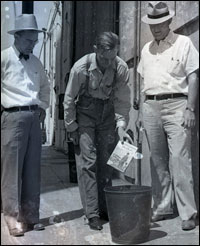This is a famous photograph of Clell Pruett, a farm worker, burning a copy of The Grapes of Wrath while two leaders of Associated Farmers, an organization made up of California agricultural producers, look on. I heard about this incident on NPR this morning; click here for a link to the story.
As might be expected, members of Associated Farmers were not too pleased about The Grapes of Wrath, which they thought portrayed them unfairly and also encouraged union organizing, which they very much opposed. In some counties in California, the book was banned from libraries. According to the NPR story,
Camp [leader of a local Associated Farmers branch] wanted to publicize the county’s opposition to The Grapes Of Wrath. Convinced that many migrants were also offended by their depiction in the novel, he recruited one of his workers, Clell Pruett, to burn the book.
Pruett had not read the book at that point, though he had heard about it and did not like what he had heard, and when he got around to reading it a few years ago (after the NPR reporter gave it to him), he said he “had no regrets” about burning it.
I thought this might be useful for a discussion of protests and how dominant groups may orchestrate protests that denounce or invalidate criticisms of their positions of power. We see a somewhat similar phenomenon today with the so-called “Astroturf” organizations, a term coined to refer to what appear to be citizen advocacy groups but that are basically fronts for corporations or industry groups to push their agenda, often with little or no support from anyone not directly connected to the corporations involved–the term makes fun of their attempts to portray these groups as “grassroots.”
It also brings up interesting issues about agency. I suspect many on the left who are generally sympathetic to organized labor would view Pruett as a traitor or a dupe–an ignorant fool who was used by those in power to undermine the very cause that would have improved his life. But there’s a big assumption there–that it would be impossible for a farm worker to simply be offended by the depiction of workers in The Grapes of Wrath (or to be opposed to the labor movement more generally). So this might spark a discussion about the ideas of “interests” (i.e., that workers’ interests are served by organizing) and who gets to decide what they are (or which set of interests should be prioritized). Is Pruett a traitor to organized labor? Did he betray other farmworkers? Is he just a tool of the wealthy landowners who often exploited workers, or was there a legitimate reason some workers might have been offended by The Grapes of Wrath?
This isn’t to discount the fact that those in power often search for an “authentic” voice they can use to delegitimize criticisms. For instance, universities using American Indian mascots have often looked for a group of American Indians willing to state that they either don’t oppose or actively support the mascot. In some cases these supporters were from other states and might have been offered scholarships or other incentives that led many mascot opponents to question whether they were basically being bribed.
I just thought it might make a good addition to a discussion of social movements and protests in general–how do we conceive of counter-movements and the role of the dominant group in them? When and in what way do the powerful use members of the supposedly aggreived group to delegitimate criticism? And who gets to decide when someone is being used and when they are, of free will and presumably sound mind, in agreement with the group that others perceive to be oppressing him or her? Who gets to decide you’re being oppressed, even if you don’t feel like it?
Of course, it would also make a nice image for a discussion of freedom of the press.


Comments 3
bluesaepe — October 2, 2008
My favorite part of all this? Pruett burned the book (literally banishing it from his worldview) and then found another copy to read later.
Ha! Way to prove the hollowness of your own posturing, dude.
Gwen Sharp, PhD — October 2, 2008
Just to clarify, he didn't go get the book himself--the reporter gave it to him to read.
Kirsten — October 2, 2008
I have to say that when I first read The Grapes of Wrath I didn't like the portrayal of the farmworker characters in the beginning of the book. I thought it was crude and unsympathetic. If I hadn't had a reason to keep reading, I might have stopped there and not have realised that it alters (deliberately) as the book continues.
There are always members of groups who don't vote the way you'd expect, or sympathise with the point of view you'd automatically assume. Like all the people on low incomes who have historically voted for conservative political parties, even if they'd be better off under socialist policies.